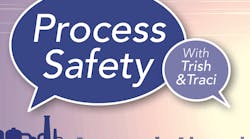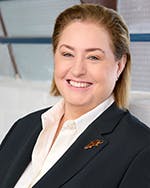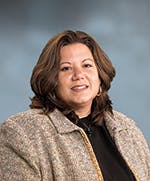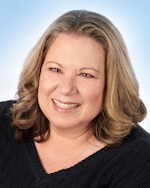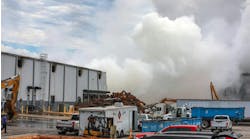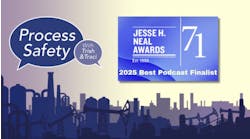Transcript
Traci: Welcome to Process Safety with Trish and Traci: the podcast that aims to share insights from past incidents to help avoid future events. I'm Traci Purdum, editor in chief of Chemical Processing, and as always, I'm joined by Trish Kerin, the director of the IChemE Safety Centre. And in this episode we have a guest podcaster, Craig Wright. Craig joined the IChemE Safety Centre as a Process Safety Specialist following almost 20 years in the offshore oil and gas industry. Welcome to you both. I know you've been taking your show on the road lately. You want to give me a little bit of update of what you've been up to?
Trish: Hi Traci. So we've been traveling around the UK visiting a whole range of different companies talking about process safety. It's been great opportunity to get to know Craig a little bit better since he's joined and to get out and speak to companies about process safety.
Traci: Well that's awesome. Well, our episode today looks at transferable skills. Many of our listeners are in the thick of it, maintaining and operating chemical facilities, but at some point roles can change, and Craig, that certainly is the case with you. Can you give us a little bit of history on your background and your interest in safety?
Craig: First of all, I'd just like to say thanks very much for having me on the podcast today. My job began through an instrumentation and control apprenticeship with OPITO, which was based in Edinburgh. That's where we kind of learned the basics prior to going offshore. I was then sent offshore in the Northern North Sea and completed my instrumentation and control apprenticeship on board the North common asset. My interest in safety first began shortly after I went offshore. During this apprenticeship phase is when I started to notice a lot of the investigations, and they have a root cause of operator done X causing Y. The root cause was very consistent with operator error. And at this point, that's when I started to really query, there must be more to an incident. You can't just simply end it with people knowing that there must be more to it. That's when I became a safety rep and began my journey in safety.
From there, I then transitioned into the operations and process team offshore with the oil and gas company TAQA. I then progressed on achieving my hydrocarbon processing qualifications. After three years learning and developing with TAQA, I moved to Shell in order to begin Alpha, which is in the Central North Sea. Here I attend my competencies for controlling operations and operations supervisor. And it was during this time I began to evaluate myself and what journey I would like to take in my career. From the mid 2014 till 2016, we all know the oil industry, it's seen a significant decline in the price per barrel and knock on effective investments in instability for start. At this point in my career, which was still quite early on, I identified that a lot of my eggs were in the same basket. And I wanted to diversify myself, just basically to try and ensure that I had a secure future going forward and that I could look external to the oil and gas industry.
At this point, I'd wanted to carry out academic training and that would allow me to diversify myself. I wanted to carry out academic training that would allow me to diversify while also complementing my industry experience knowledge and competence. This would allow me to be in a position that have transferable skills while also complementing everything that I've learned of an entire career. This had led me to carry out an MSc in safety and risk management with the University of Strathclyde in Glasgow. I reached out to Strathclyde to discuss what requirements were needed to join the program and they helped identify that I would have to carry out the NEBOSH training to bridge the gap prior to enrollment in MSc.
Then obtaining my MSc in 2020 and post Covid, I opted to look for a new role. I knew I had more to offer to help people in organizations, but I had to find a suitable. I knew I had to break away from the fixed rotation of offshore oil and gas life. It took some time to see a suitable role that aligned with my values and I'm glad I stayed the course. From there, I moved to IChemE Safety Centre as a process safety specialist and I haven't looked back yet.
Traci: Well, Craig, you obviously curiosity and the want and need to diversify are very admirable skill sets and you, you've transitioned from one industry into a very different one. What skills have you brought with you from your former life into the IChemE Safety Centre life?
Craig: Yeah, this is a great question considering the route I've taken to join IChemE, it's quite squiggly career so far. Throughout my career and since joined IChemE, I've heard a lot of the same concerns from company leaders, which is how do we get operators, which is ultimately the frontline to understand and ensure accountability for process safety and how can we improve operator discipline? But now I've joined IChemE Safety Centre as a highly experienced frontline operator who's taken a challenging route to this position, I feel that I can now assist well members and organizations going forward through that frontline experience. In my career, I've been directly involved in incidents, I've witnessed incidents, and I've also investigated incidents having taken significance from all of these. I've witnessed poor leadership delivery and also effective leadership delivery of the findings of such incident.
I feel my grassroots learnings through to my current position help bring a different perspective to process safety going forward which, with effective collaboration, can be powerful tool. I believe I bring a boots in the ground experience and perspective in the senior teams that's supported by my academic learning. I'm now in a position to use my experience in academia to help other organizations understand safety, culture and how effectively leadership can impact the hospitals. Something I also find is quite important is I also bring a fresh set of eyes into the team. Something I always feel an apprentice technician does for an organization, fresh set of eyes asking me why questions generates a key that still of evaluation and current processes that can be invaluable to enhancing safety.
Traci: And I agree with that. A fresh set of eyes with anything just... Initially you may think they are silly questions or ignorant questions and Trish knows that I can toss out many of those, but then they spur another way of thinking of things and I think that's invaluable. Trish, why is it important to understand these transferable skill sets that Craig's talking about?
Trish: I think one of the most important parts about it, Traci, is that when we start to explore how to improve process safety and how to get better at all these things, there's only so much we can learn if we only look inwardly to our own company, our own site, our own sector even. We need to be looking more broadly to other sectors to learn what they're doing, what they're doing differently, and how they can approach process safety in that slightly different way that might challenge something that we're currently doing. And so the idea of seeing those transferable skills, especially direct operational experience skills, and being able to bring those into a range of other industries, it can sometimes lead to being asking what seems to be the silly questions. But as you know, I always say there are no silly questions. It's actually about understanding and about making sure we all have the right understanding. So the diversity of thought is so critical in creating improved process safety outcome.
Traci: Craig, you had mentioned the additional training and you said you're the boots on the ground and I think that is... That's a great visual, but obviously you needed a little additional training. Can you talk a little bit about that?
Craig: Yeah, so a significant amount of training and all aspects of safety from the oil and gas industry, which I'm forever thankful for and it's sent me on this path. But unfortunately a lot of those skill sets aren't quite transferable in the academic world. So prior to being allowed on the MSc program with Strathclyde University, I had to do the NEBOSH training. This was almost a introduction, shall we say, to occupational and also process safety from construction straight through to people management. Once I completed this, I was then able enroll in the MSc and safety and risk management, leave school and go straight to university. So that was why I had to do the bridging gap. I took more challenging path through getting to the role that I'm in now. Since being and joining IChemE, I'm aiming to figure address on with my professional development so that I'm always developing an environment to support our members in such diverse industries, but with the same goals of enhancing process safety for everyone.
Traci: Trish, what made you consider Craig for his current role? How did you find him and your thoughts on having his type of expertise on your team?
Trish: Yes. So we were advertising for a process safety specialist to come and join our team. And Craig had sent in his resume and we sort of had gone into this recruitment process with a mandatory requirement that we were looking for an engineer. Now, obviously, Craig had operational experience and then he went on to do a master's in the safety and risk management area. But if I had have just blindly applied that criteria of I needed an engineer, he wouldn't have made the cut for an interview. But I found his resume very interesting in that he actually gave a lot of detail of some projects he'd undertaken on his particular platform and how he'd delivered outcomes in those projects as well as having the master's in risk and safety management. So that was a key part of it too. We invited him in for an interview and had a conversation and I thought to myself, I really like the diversity of his thought, the fact that he does bring so much frontline operational skill and experience to the table, which is something that we don't have in the Safety Centre.
I've worked in operations management and leadership, but I've not actually been an operator, frontline operator myself. And so I think it complements the skill set we have in the centre around making sure that we can look at the entire breadth of an organization and really focus on how we get better process safety outcomes from the frontline to the boardroom because we have to get that happening right across organizations. We can't only just work in one area
Traci: And obviously we're talking about the IChemE Safety Centre here, much different than a facility. But this diverse cross-functional work team in the name of safety is important and that's the lesson here.
Trish: Absolutely it is. We need that diverse thinking, that diverse set of skills because solving process safety problems will always require... It's a team sport. Everybody has to play their part and everybody has a different part to play and we've got to make sure that we've got the right players on the field, otherwise we won't win the game as they say.
Traci: Well, Craig, how has this transition been for you? You were in a whirlwind schedule of two weeks on, two weeks off, and now you're essentially in a nine to five job. Do you miss the hubbub of your previous career?
Craig: That's a great question, Traci. It's a transition that I thought I'd be okay with, but in hindsight, I've completely underestimated that. Although Trish and Traci and the IChemE Safety Centre team didn't. Not only did I underestimate changing from rotation work into nine to five, but I underestimated leaving the intense team working environment that was in offshore. As IChemE's truly international centre, it requires a lot of working from home, it traveling and then joining in team meetings. Whereas I was typically always used to a team of five or six highly experienced and skilled people who I'd worked closely with over a 12 hour shift driven by compliance and deferment. So yeah, it's been very challenging to remove yourself from working with your hands for 12 hours focused on a regime to sit in with a laptop, with a computer, and focusing that way. But I am enjoying it.
I don't miss the offshore life yet. I don't think I will. It's a much nicer pace at the moment. In podcast 35 of Trish & Traci you had Tony Bocek from BP. And during that you had discussed that operators have the potential to positively fail process safety advisory roles and they can come role use their experience, their hands safely for everyone around them that be the onshore support teams and the offshore teams prior them. Going back into the roles on the shop floor, the main problem for organizations was getting the operator who used to be outside and physically active to get them, to sit in front of a PC or laptop long enough to do the role. And it's one that Trish is ensuring that I'm in a good position to keep going with. Given I've been in the oil and gas industry for hosted 20 years, you can appreciate the challenges that it brings.
I personally would typically be informed of an airport check in time. And then I would work shifts, 6:00 AM to 6:00 PM or 6:00 PM to 6:00 AM and then would've a check in time given to me to go home. It's very strict. Everybody would deliver a time to you of here's where you have to be, here's where you're going, better regimented. And now I have a role that's very flexible which is... It lets me try and make the role my own, which is great. But again, it's challenging to find that balance. And I probably attached myself more the other way now that I feel I have to always be at the laptop and I need to remember that it's okay to step away and nobody's going to get hot during the time it takes me go and make a coffee.
Traci: And that's an interesting thought too, is when you're the boots on the ground and you're in the thick of it, you are constantly having to worry about everybody around you and making sure your safety is intact. But this role is now a very different one in terms of you have to fashion your own thoughts and help others become safe. And Trish, I wanted to ask you a little bit about the importance of having someone like Craig on your team to help disseminate the safety lessons that you're always talking about.
Trish: Yeah, so from my perspective... From my perspective, I think it's really important to have those different voices on the team and the different experiences coming in. And one of the things that probably is, I'm sometimes a little bit unusual, is I like to be challenged by others because it helps me improve my own thinking. So having someone that thinks a little bit differently to me and that has a very different experienced background to me is quite helpful to make sure that when I come up with some wild hair brain idea, which I have been known to do on occasion, that there's someone with a sound thought process that can just sit there and say, "Trish, are you really sure?" And challenge my thinking and get me to sometimes rethink and reframe, come up with different ways, a different way of thinking about it, making sure that we can communicate the message broadly throughout the whole organization so that it lands with everybody, not just with part of the organization only.
So I think that's a really valuable part that I've certainly enjoyed having Craig on board so far. And yeah, he sometimes asks me, "Really, are you sure about that?" And that's a good thing I think.
Traci: And Craig, what are your goals? I know you, you've just started, you're just into it, but what are your goals for this new role that you're taking on?
Craig: So I've worked from an apprentice carrying through to leading a team of highly experienced, multi-disciplined operators and achieving increased productivity in a safe, reliable, and sustainable manner. I believe this was and is only possible through getting your team on board. If you, as a leader, want to perform well, then you need to ensure you listen and support the team. This is when we begin to build something special in culture and we begin to see the fruits of our labor with increased performance productivity. I mentioned earlier that a lot of organizations appear to struggle with operator discipline. And I feel like all for me going forward is going to be assisting to close this gap. I'm passionate about safety and I want everyone to go home from work in the same positive health and safe condition as they arrive, if not better.
This is from process safety, occupational safety, and through to mental safety. Sometimes we forget that the workplace can be so much more for colleagues than simply doing a job and going home. I feel that if you want to succeed, you need to listen and communicate as it's the currency of safety.
Traci: Trish, do you have anything to add?
Trish: Yeah, I'll just add that I think one of the key themes that's come out through this podcast is the idea that sometimes you've got these transferable skills, but you still may need to do some further education to cement them and to grow further. And so that you can more easily transition to another industry sector for example. And I think that's something we're going to see more and more into the future. And so the one of the things that my father always said to me is, "There's one thing that no one can ever take away from you, and that's your education." And so from my perspective, if you're interested in safety, then go out and do a course, go and learn something about it. Go and expand your knowledge and then think about the experiences you've had in your industry. Chances are it's very transferable to another industry if that's a change you want to make. So I think that's a really important aspect. And I just lastly like to add that I love that comment on listening and communicating, Craig.
Traci: Well, you both are all disseminating the safety message so that it lands with everybody. And Craig, your willingness to want to close the gap on operator discipline, it ensures that your team, you and Trish will be a great team in process safety. So I appreciate you joining us today. Unfortunate events happen all over the world, and we will be here to discuss and learn from them. Subscribe to this free podcast so that you can stay on top of best practices. On behalf of Trish and Craig. I'm Traci, and this is Process Safety with Trish and Traci.
Trish: Stay safe
Want to be the first to know? Subscribe and listen to Process Safety With Trish & Traci on these platforms
